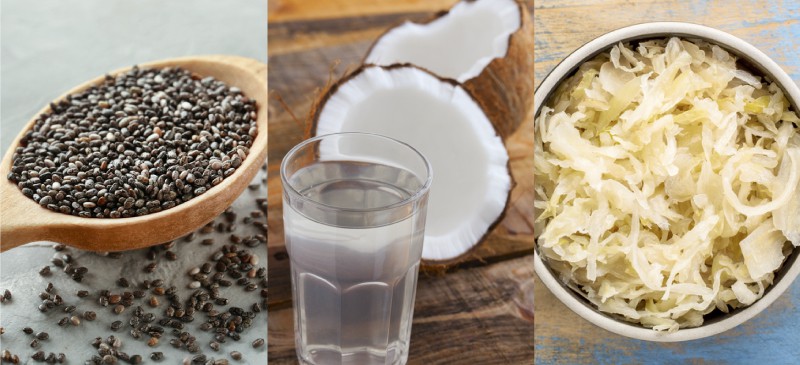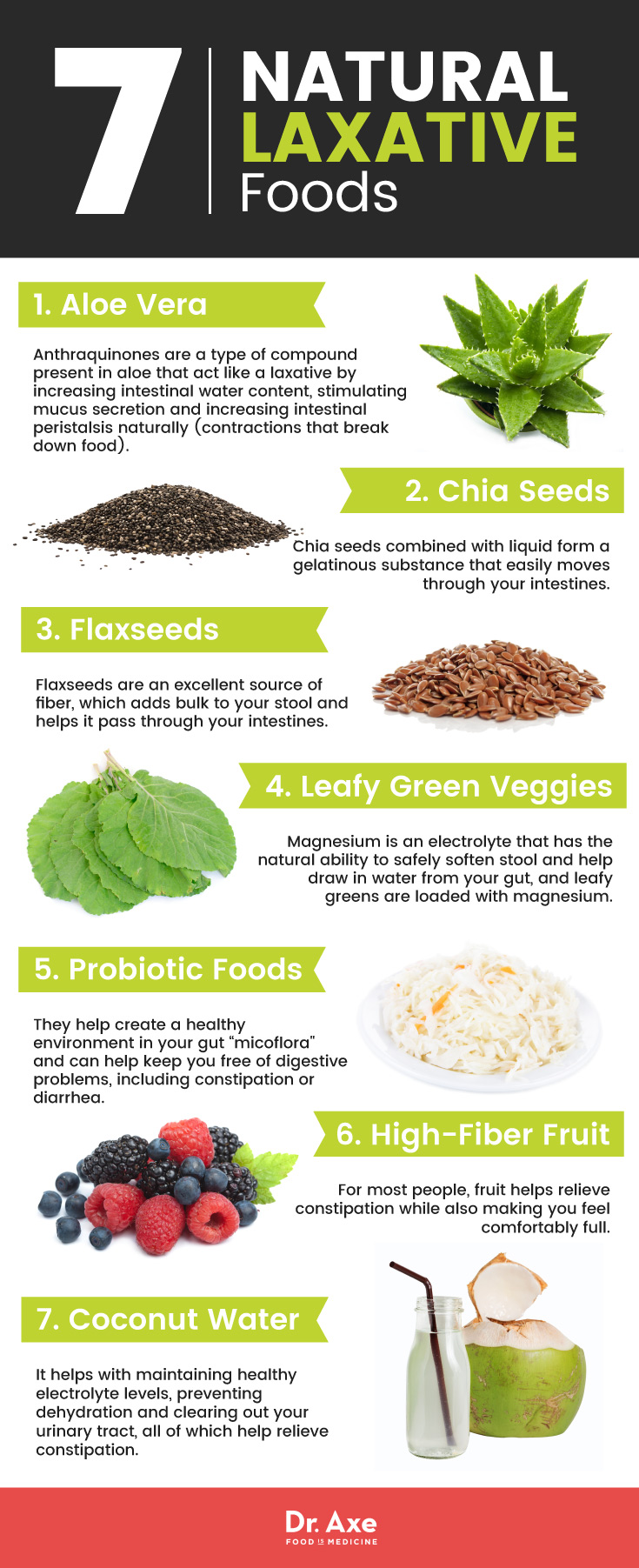
Natural laxatives, in the form of certain foods and herbs, have been used for wellness purposes to alleviate constipation for over 2,000 years. People have always known that bowel movements are necessary for good health, but in today’s fast-paced society, a poor diet, stress or frequent traveling can get in the way of you and good digestion — so pooping regularly can suddenly become tough!
To deal with not being “regular,” many people turn to laxatives to get the job done fast. In fact, laxatives are one of the most commonly bought over-the-counter medications there is. According to the Department of Clinical Neuroscience at the University of North Dakota School of Medicine, people who abuse laxatives regularly are generally categorized as falling into one of four groups. (1)
By far the biggest group of laxative users is “individuals suffering from an eating disorder such as anorexia or bulimia nervosa,” with estimates showing that 10 percent to 60 percent of those with disordered eating use laxatives to help control their weight and feelings.
Other individuals who regularly use laxatives include middle-aged or older adults to alleviate constipation as digestive functions slow down; athletes or bodybuilders who are trying to maintain a certain weight and look; and people who deal with digestive system disorders.
How Do Laxatives Work?
When someone has a normal bowel movement, the stool is formed by the absorption of waste, unwanted nutrients, electrolytes and water within the gut. These normally come together to make a soft-but-solid substance that is then able to easily pass through the digestive tract. Most of the nutrients from the foods you eat are not actually absorbed in the stomach, but in the small intestine, while the large intestines, or colon, mostly absorb water. After traveling through your stomach and intestines, waste moves down to your colon, where it’s ready to make it’s way out.
The entire digestive process involves many aspects of your body, including enzymes, electrolytes, water, hormones, blood flow and more, so you can see why constipation can occur for many different reasons, including:
Today, there are dozens of different laxatives available on the market to resolve constipation — everything from herbal teas and detox tinctures to pills and enemas. Technically, there are several types of laxatives that work in various ways: stimulant agents; saline and osmotic products; bulking agents; and surfactants.
The type of laxative that most people use regularly and buy over-the-counter (OTC) are stimulant laxatives — which are also thought to be the most over-used. These products cause a laxative effect by stimulating the lining of the intestines and making the muscles of the digestive system contract, while also increasing stool’s hydration. Over time, stimulant laxatives can actually weaken the body’s natural ability to go to the bathroom, which is why they pose the risk for “laxative dependency.” (2)
Other types of laxatives are osmotic and hyperosmolar laxatives, which are hydrating agents that draw fluids into the intestines. An enema is the type of laxative inserted into the rectum so it can directly deposit saline fluid.
“Bulking agents” are types of fiber treatments that are the mild laxatives most doctors recommend first to patients for increasing slow transit time. (3)
Lubricant laxatives work by making stools “slippery,” usually with mineral oils that coat the intestinal walls and prevent stool from drying out.
It’s important to realize that while OTC or prescription laxatives might help solve a case of short-term constipation, they ultimately don’t fix any underlying digestive issues. In fact, they can make the problem even worse; cause many unwanted and dangerous side effects; and even become addictive since the body begins to rely on them over time to function properly!
Why Some Laxatives Are Dangerous
While laxative abuse has occurred for many years, today we see more cases of laxative “purging” than ever. People who would consider themselves healthy and “normal eaters” might use laxatives every week, or even multiple times per week, in order to control their weight. In an era where up to 80 percent of women (especially young women) and high percentages of men are actively trying to control their food intake and are worried about gaining weight, laxatives have taken on a certain appeal as a “quick fix.”
People falsely believe that they can avoid some of the “absorption of calories” from the foods they eat, but this isn’t even true for the most part and actually can lead to many dangerous side effects.
Health problems associated with laxative abuse include:
- dehydration (fluid loss)
- acid/alkaline base changes
- edema (water retention)
- dizziness and light-headedness
- damage to the colon and digestive organs
- alternating diarrhea and constipation
- complications with the cardiovascular systems
- weight loss or gain
- other life-threatening side effects, including death when overused (4)
After taking laxatives, it’s not uncommon to deal with some serious gastrointestinal complaints. The renin-aldosterone part of the digestive system becomes activated when taking laxatives, which results in the loss of fluid. The body rebounds by holding on to all of the available water it can get, which leads to edema (water retention or bloating) and short-term weight gain, even a slowdown in your metabolism once laxative intake is stopped.
The aftermath of laxative use usually leaves people feeling panicked because they are suddenly uncomfortable; very bloated from carrying around excess fluids in their digestive tracts; and possibly unable to go to the bathroom normally. For some people, this triggers further use of laxatives in order to get the body to shed water and solve any symptoms of rebound constipation. (5)
OTC lubricant or bulking agents also usually come with some not-so-pleasant side effects. Fiber works by increasing the water content and bulk of the stool so it can move quickly through the colon. Naturally occurring fiber from food is great for this purpose, but people who increase their fiber abruptly can suffer abdominal cramping, bloating or gas. Too much synthetic fiber or overuse of mineral oils from laxatives can also reduce your body’s absorption of some drugs and medications. Another issue is that lubricant laxatives can absorb fat-soluble vitamins from the intestines and decrease certain nutrient levels.

What to Use Instead: Foods that Improve Digestive Function
Our bodies have an amazing natural ability to cleanse and detox on their own — we just need to provide the correct nutrients and hydrating fluids. Low water and nutrient intake can lead to the buildup of toxins in our bodies because the digestive tract becomes dry while the liver and kidneys, the main detoxifying organs, slow down functioning.
A much better way to relieve constipation over using laxatives is to make long-term changes to your diet. Your body can only really “detox” when you stop putting in the wrong things and start giving it what it really needs to function properly. Eating more fiber; removing inflammatory foods that cause constipation in the first place; and adding in foods with natural laxative properties are much safer approaches than relying on any laxative capsules, juices, colonics or pills.
Is there ever a time that laxatives are appropriate and really needed? Sure, but probably not as often as people assume. For otherwise healthy adults, it’s likely OK to take laxatives every now and then, such as when you’re traveling and jet-lagged or dealing with a short-term stomach illness. If you do feel that you need to take a laxative, try a gentler, natural product such as castor oil.
Most experts agree that it’s important to go to the bathroom at least three or more times per week at a minimum. But the number of bowel movements someone should have each day/week varies from person to person, so there is not one specific number that is considered completely “normal” and healthy.
The bottom line is that if you’re currently not going at least this amount, making changes to your diet and lifestyle first (for example, exercising and reducing stress) are crucial to solving the problem long term.
Most adults, and children too, could afford to eat more fiber. While increasing fiber alone might not solve all cases of constipation, it’s definitely one of the first steps to take. Make sure you aim to get between 25–40 grams of fiber per day, with adult men/larger individuals needing a higher amount than women and smaller individuals. You always want to get your fiber from natural sources (unprocessed, whole foods) whenever possible as opposed to artificially created fibers. While many high-fiber foods act like natural laxatives, synthetic fibers found in processed “high-fiber” bars, shakes, smoothies or dairy products might not work the same way.
Focus first and foremost on eating real, whole foods, especially plenty of fresh fruits and vegetables. Nearly all types of vegetables, fruits, ancient grains, seeds, nuts and beans are great sources of both soluble and insoluble fiber, along with important electrolytes, vitamins and minerals that your digestive system relies on. A higher nutrient intake in general increases your ability to form solid stools and successfully pass them through your digestive system.
One thing to note about foods with natural laxative properties: Each person is a bit different, and not everyone reacts to foods in the same way. For example, some fruits/veggies contain FODMAPs, types of carbohydrates that are tough for some people to break down, which can can actually worsen bloating/constipation problems and cause IBS-like symptoms. So, always test your own reaction to foods, and try to avoid any that you’ve noticed specifically cause you digestive distress.
7 Foods that Make the Best Natural Laxatives
Fruits, veggies, seeds, probiotic-filled foods and more can have a laxative effect as natural stool softeners. So before you reach for the OTC laxatives, add these seven foods to your diet:
1. Aloe Vera
Aloe vera is one of the oldest and well-researched natural laxatives there is. (6) Sometimes called aloe “latex,” this substance comes packed with enzymes, vitamins, minerals and electrolytes that help heal the gut. For example, anthraquinones are a type of compound present in aloe that act like a laxative by increasing intestinal water content, stimulating mucus secretion and increasing intestinal peristalsis naturally (contractions that break down food).
Aloe vera latex also has anti-inflammatory components that reduce swelling and and improve function of the digestive organs. Some of the other benefits of aloe vera are its ability to help normalize acid/alkaline and pH balance, lessen yeast formation and encourage the growth of good digestive bacteria.
2. Chia Seeds
One of the benefits of chia seeds is its ability to work as a natural laxative. Chia seeds combined with liquid form a gelatinous substance that easily moves through your intestines. As a great way to increase the fiber in your diet, chia seeds swell and expand in the digestive tract, absorbing water. They’re best for constipation when you also increase your fluid intake, helping them move through the gut easily.
3. Flaxseeds
Flaxseeds are an excellent source of fiber, which adds bulk to your stool and helps it pass through your intestines. As an added bonus, flaxseeds work to treat both constipation and diarrhea! (7)
They’re practically tasteless, and one of the benefits of flaxseeds is it’s easy to use in recipes you already make, like oats, baked goods and smoothies. Just remember that whenever you eat a lot of fiber, you want to also make sure to drink plenty of water too — since a high amount of fiber without enough hydrating liquids can actually result in even more bathroom troubles! Drinking enough water in general along with a high-fiber diet makes it less likely you’ll experience uncomfortable hard stools, bloating, gas, pains and further constipation.

4. Leafy Green Veggies
Not only a great source of fiber, leafy greens also provide plenty of magnesium. Magnesium deficiency is one of the most common deficiencies in adults, so eating more comes with many benefits, including better digestive health. Magnesium is an electrolyte that has the natural ability to safely soften stool and help draw in water from your gut. (8)
Without enough magnesium, it’s hard for stool to easily move through your system, especially since magnesium is a natural muscle relaxer, which can help stop cramping in the abdomen. If you notice that increasing magnesium-rich foods results in your stools becoming too loose and watery, you can adjust your intake until its comfortable and back to normal.
5. Probiotic Foods
Probiotics are “good bacteria” in your gut that are able to balance various types of “bad bacteria.” They help create a healthy environment in your gut “micoflora” and can help keep you free of digestive problems, including constipation or diarrhea. (9)
Probiotic foods include things like kefir, kombucha, sauerkraut, kimchi and probiotic yogurt. Just make sure that when buying dairy products, you always choose organic products, as they are easier on digestion, such as goat milk products, organic kefir, raw dairy products or dairy that doesn’t contain A1 casein. It’s possible that low-quality pasteurized/homogenized dairy, or too much dairy in general (especially if someone has symptoms of lactose intolerance), can cause inflammation and contribute to digestive dysfunction.
6. High-Fiber Fruit (Berries, Figs, Apples, Prunes, Pears)
Fruit provides high levels of fiber and water in addition antioxidants, which can help to reduce inflammation throughout the digestive system. While fresh fruit such as berries, melon and apples are more hydrating and filling, dried fruit like figs, prunes or dates are also a good source of dietary fiber when in a pinch, especially when you consume several at once.
Fruits that contain pectin fiber (apples or pears) are especially good choices, since pectin stimulates your bowels. Apple cider vinegar is also an excellent option for naturally treating constipation! For most people, fruit helps relieve constipation while also making you feel comfortably full, but again it comes down to individual reactions to various kinds.
7. Coconut Water
Coconut water is good for you for many reasons — not only does it taste great as an alternative to plain old water or sugary drinks, but it also helps with maintaining healthy electrolyte levels, preventing dehydration and clearing out your urinary tract. For centuries, coconut water has been used for a natural hydration boost due to its high electrolyte content, especially potassium (which it provides 12 percent of your daily value of in every one-cup serving). (10)
In fact, coconut water can be so healing for constipation that some people find drinking too much loosens stools to an uncomfortable level, so start slow.
Recipes to Help Prevent & Relieve Constipation
Easy, Blended Pea Soup (with Chick Peas!)
Coconut Chia Pancakes
Apple Cinnamon Baked Oatmeal
Chewy, No-Bake Homemade Granola Bars
From the sound of it, you might think leaky gut only affects the digestive system, but in reality it can affect more. Because Leaky Gut is so common, and such an enigma, I’m offering a free webinar on all things leaky gut. Click here to learn more about the webinar.

Original article and pictures take draxe.com site

Комментарии
Отправить комментарий